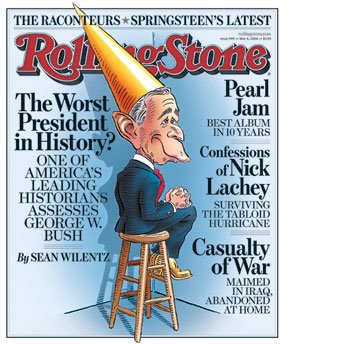
I've seen this posted on Shakespeare's Sister, Americablog, and a few other blogsites yesterday. It is the cover story from Rolling Stone Magazine. Written by Sean Wilentz and titled The Worst President in History, the story is devastating. From Rolling Stone:
George W. Bush's presidency appears headed for colossal historical disgrace. Barring a cataclysmic event on the order of the terrorist attacks of September 11th, after which the public might rally around the White House once again, there seems to be little the administration can do to avoid being ranked on the lowest tier of U.S. presidents. And that may be the best-case scenario. Many historians are now wondering whether Bush, in fact, will be remembered as the very worst president in all of American history.
In early 2004, an informal survey of 415 historians conducted by the nonpartisan History News Network found that eighty-one percent considered the Bush administration a "failure." Among those who called Bush a success, many gave the president high marks only for his ability to mobilize public support and get Congress to go along with what one historian called the administration's "pursuit of disastrous policies." In fact, roughly one in ten of those who called Bush a success was being facetious, rating him only as the best president since Bill Clinton -- a category in which Bush is the only contestant.
How does any president's reputation sink so low? The reasons are best understood as the reverse of those that produce presidential greatness. In almost every survey of historians dating back to the 1940s, three presidents have emerged as supreme successes: George Washington, Abraham Lincoln and Franklin D. Roosevelt. These were the men who guided the nation through what historians consider its greatest crises: the founding era after the ratification of the Constitution, the Civil War, and the Great Depression and Second World War. Presented with arduous, at times seemingly impossible circumstances, they rallied the nation, governed brilliantly and left the republic more secure than when they entered office.
Calamitous presidents, faced with enormous difficulties -- Buchanan, Andrew Johnson, Hoover and now Bush -- have divided the nation, governed erratically and left the nation worse off. In each case, different factors contributed to the failure: disastrous domestic policies, foreign-policy blunders and military setbacks, executive misconduct, crises of credibility and public trust. Bush, however, is one of the rarities in presidential history: He has not only stumbled badly in every one of these key areas, he has also displayed a weakness common among the greatest presidential failures -- an unswerving adherence to a simplistic ideology that abjures deviation from dogma as heresy, thus preventing any pragmatic adjustment to changing realities. Repeatedly, Bush has undone himself, a failing revealed in each major area of presidential performance.
Wilentz lays everything down as to Bush's failures. In Iraq, Wilentz shows how Bush squandered his over 90 percent public approval ratings after the September 11th attacks, by siding with the neocons in pushing their unprovoked invasion of Iraq, and in engaging in partisan attacks against the Democrats who questioned or opposed the war. He shows how the Bush domestic agenda has failed at home--the regressive tax cuts that have benefited the rich elites, the massive budget deficits, the re-emergence of "supply-sided voodoo economics," the failures of No Child Left Behind Act, Katrina, FEMA, the continued pushing of Christian evangelical dogma into all aspects of public policy--abortion, contraception, FDA legislation, censorship imposition, environmental policies, intelligent design, scientific studies. There are the scandals of Valerie Plame, Iraqi WMD failures, Jack Abramoff, Scooter Libby, David Safavian. Wilentz even lays down the contempt that the Bush administration has for the checks and balances of divided government, by showing how Vice President Dick Cheney and Attorney General Alberto Gonzales is reshaping the presidency towards a "presidential absolutism," where "the presidential powers as commander-in-chief in wartime are limitless." Wilentz says that, "No previous wartime president has come close to making so grandiose a claim."
Wilentz doesn't just show the Bush administration's failures on domestic and foreign policy issues, he also places those failures in context with the successes and failures among previous presidential administrations. He looks at how the previous administrations of Abraham Lincoln, Franklin Delano Roosevelt, and John F. Kennedy managed to steer the country through serious foreign and domestic crisis, how the wartime presidents of James Madison, John Polk, William McKingley, and even Woodrow Wilson were able to overcome anti-war sediments. Wilentz looks at past presidential scandals of Andrew Johnson, Warren G. Harding, Ulysses Grant, and even Ronald Reagan. And yet even within the context of history, President Bush still refuses to learn those lessons that history can teach. Wilentz write:
Having waved away the lessons of history in the making of his decisions, the present-minded Bush doesn't seem to be concerned about his place in history. "History. We won't know," he told the journalist Bob Woodward in 2003. "We'll all be dead."
Another president once explained that the judgments of history cannot be defied or dismissed, even by a president. "Fellow citizens, we cannot escape history," said Abraham Lincoln. "We of this Congress and this administration, will be remembered in spite of ourselves. No personal significance, or insignificance, can spare one or another of us. The fiery trial through which we pass, will light us down, in honor or dishonor, to the latest generation."
It is a devastating article. Please read it.
No comments:
Post a Comment